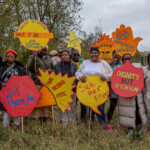The NCADC blog is pleased to welcome three guest posts from Molly Haglund, who has just completed a Masters Degree in Human Rights Practice at the Universities of Roehampton, Gothenburg and Tromsø. They are edited excerpts from her thesis entitled Punished for Persecution: An Analysis of the Criminalization of the Asylum Seeker in the United Kingdom.
The three posts examine the issues of (1) The Criminalization of asylum seekers, (2) A Tradition of Deterrence and (3) Why Criminalize the Asylum Seeker?
The Criminalization of Asylum Seekers
In 2002, asylum applicants comprised 49% of net migration to the United Kingdom, peaking at an all time high of 84,130 asylum applications (Blinder, 2011b). By the end of 2011, this number had drastically dropped by well over three quarters, with a grand total of 19,804 applications for the year (Home Office 2011). Despite this heavy decline, however, “the asylum seeker” remains at the forefront of the immigration question within the United Kingdom.
On the 16th of October 2011, the Migration Observatory based at the Centre of Migration, Policy and Society (COMPAS) at the University of Oxford released a report entitled, Thinking Behind the Numbers: Understanding Public Opinion on Immigration in Britain. The survey, conducted in September of 2011, asked a series of questions regarding immigration and immigrants to a sample of 1,002 adults living in Britain. The survey sought to address two separate elements of the immigration debate, asking: “First, who do people have in mind when thinking and answering questions about ‘immigrants’? Second, do people’s views about reducing, increasing or maintaining the number of immigrants coming to the UK vary across specific groups of immigrants?” (Migration Observatory 2011: 3).
Its results found that the majority of the population (69% to be exact) favored a reduction in immigration numbers—a concern directed primarily toward illegal immigration. Additionally, and most importantly for purposes of this dissertation, it found that an overwhelming 62% of those surveyed said that they thought of asylum seekers when referring to immigrants in general. This is an impressive number when compared to the mere 4% of immigrants to the United Kingdom that asylum seekers currently comprise (Migration Observatory 2011).
So what may account for such a visible role that the asylum seeker has come to play in the immigration realm? How is it that individuals who have fled their homelands in fear for their lives have come to be viewed so negatively? It is the argument of this dissertation that the criminalization of the asylum seeker has contributed to these curious statistics.
The use of terms such as “illegal,” “alien” or “undocumented”—all titles employed in referring to the unauthorized or irregular migrant—and that of “asylum seeker” have blended to such an extent that their meanings, though distinct, are no longer distinguishable. Asylum and any individual seeking to claim this basic human right have come to be synonymous with illegality—operating within a discourse of criminality and securitization as opposed to one of humanitarian concern and respect. The confusion of these terms in the mind of the public has been fueled by the press, particularly the tabloids, which interchangeably utilize them. While the mystification of these terms has been greatly aided by the media and political rhetoric, perhaps more seriously is the little distinction made between these different types of migrants at the level of policy and enforcement.
The unfair processing of asylum claims, enactment of increasingly restrictive legislation, limited recourse to work or other means of survival for those who are awaiting or appealing decisions on their asylum claims, and the widespread confinement of asylum seekers within prisons and immigration removal centres (IRCs) across the United Kingdom appear to punish those fleeing persecution rather than protect them. Another reason this befuddlement may occur is because commonly, asylum seekers are unauthorized at some point in their asylum-seeking process, either before or after they have made their claim. Because asylum seekers may be both categories simultaneously, this further complicates clarity in properly distinguishing them from other migrant groups (Story 2005).
Notwithstanding this seemingly inevitable lack of clarity with regard to the precarious circumstances of individuals who oftentimes come here without documents, illegally enter the country with false papers or through smugglers, or delay making an official asylum claim for fear of detention or deportation, I contend that deliberate methods and premeditated strategies are in place to encourage and exacerbate this confusion and flow of misinformation. The blurring of asylum seekers with irregular migrants, migration with criminality in general, and policies that take a stance of mistrust, security and control and which actively and intentionally portray the asylum seeker as criminal has increased significantly in the last decade. Indeed, equating asylum seekers with criminality is a common practice that is regularly reproduced in the wider public discourse.
Despite continual lip service to a so-called “noble” tradition of offering protection, the UK consistently circumscribes and avoids its obligations to the asylum seeker. The use of containment strategies that force individuals without alternative recourse to resort to clandestine means to reach UK borders, the detention of these very individuals once they do, and laws that leave many asylum seekers destitute demonstrate the United Kingdom’s criminalization of asylum seekers through the implementation of deterrence policies. The regular depiction of the “bogus” asylum seeker in the pages of the popular press similarly presents those soliciting protection as a public threat—further aiding in the association of the asylum seeker with deviance while simultaneously fostering support for state use of these very policies.
















Dear Friend,
Having read your blog, we were hoping you would be interested in our video, “Don’t stop me now: The Calais ‘jungle’ and No Borders Camp”. It reveals the hell that was the Calais ‘jungle’ and the incredible journeys migrants staying there had made.
We have uploaded the film on the Citizen TV talent site in the hope that it may receive sufficient 5 star votes to make it a video with an award winning message which will help spread the word.
The film is available to watch and vote for here: http://www.citizen.tv/competition#!tab=top-talent&week=week-18-2014&month=&boc_month=&vo=%2Fdon-t-stop-me-now-the-calais-jungle-and-no-borders-camp-rvmp9Jeovj.html
We would be delighted if you would watch the video, vote for it and share it.
Many thanks,
Aneesa Syed
WORLDbytes Volunteer